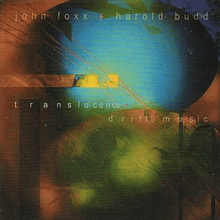Translucence/Drift Music
Translucence/Drift Music is a double studio album by American ambient musician Harold Budd and English musician and graphic artist John Foxx, which was released in August 2003. Budd and Foxx had long been engaged by the other's work, eventually working together in 1996.[2] These two discs are a record of those sessions.
| Translucence/Drift Music | ||||
|---|---|---|---|---|
 | ||||
| Studio album by Harold Budd and John Foxx | ||||
| Released | August 26, 2003 | |||
| Genre | Ambient | |||
| Length | 120:00 | |||
| Label | Demon Records / Edsel | |||
| Producer | Harold Budd, John Foxx | |||
| Harold Budd chronology | ||||
| ||||
| John Foxx chronology | ||||
| ||||
| Review scores | |
|---|---|
| Source | Rating |
| amazon.co.uk | |
Track listing
All tracks composed by Harold Budd and John Foxx.
Translucence (disc one)
- "Subtext" – 5:59
- "Spoken Roses" – 6:20
- "Momentary Architecture" – 1:40
- "Adult" – 3:03
- "Long Light" – 3:54
- "A Change in the Weather" – 2:41
- "Here and Now" – 3:59
- "Almost Overlooked" – 2:30
- "Implicit" – 5:25
- "Raindust" – 7:08
- "Missing Person" – 1:35
- "You Again" – 3:24
Drift Music (disc two)
- "Sunlight Silhouette" – 3:15
- "The Other Room" – 1:57
- "Some Way Through All the Cities" – 4:17
- "Stepping Sideways" – 3:44
- "A Delicate Romance" – 7:14
- "Linger" – 1:59
- "Curtains Blowing" – 3:06
- "Weather Patterns" – 1:50
- "Coming into Focus" – 5:02
- "After All This Time" – 6:54
- "Someone Almost There" – 1:33
- "Resonant Frequency" – 2:45
- "Avenue of Trees" – 1:16
- "Underwater Flowers" – 6:05
- "Arriving" – 1:25
gollark: Presumably a command block or something.
gollark: The program you linked looks like a Dropbox client.
gollark: I might DIE if I look at that.
gollark: Oh no. How terrible. Imagine programs PRINTING RUDE WORDS"
gollark: PotatOS's excellent dynamic metatable-based something in action.
This article is issued from Wikipedia. The text is licensed under Creative Commons - Attribution - Sharealike. Additional terms may apply for the media files.